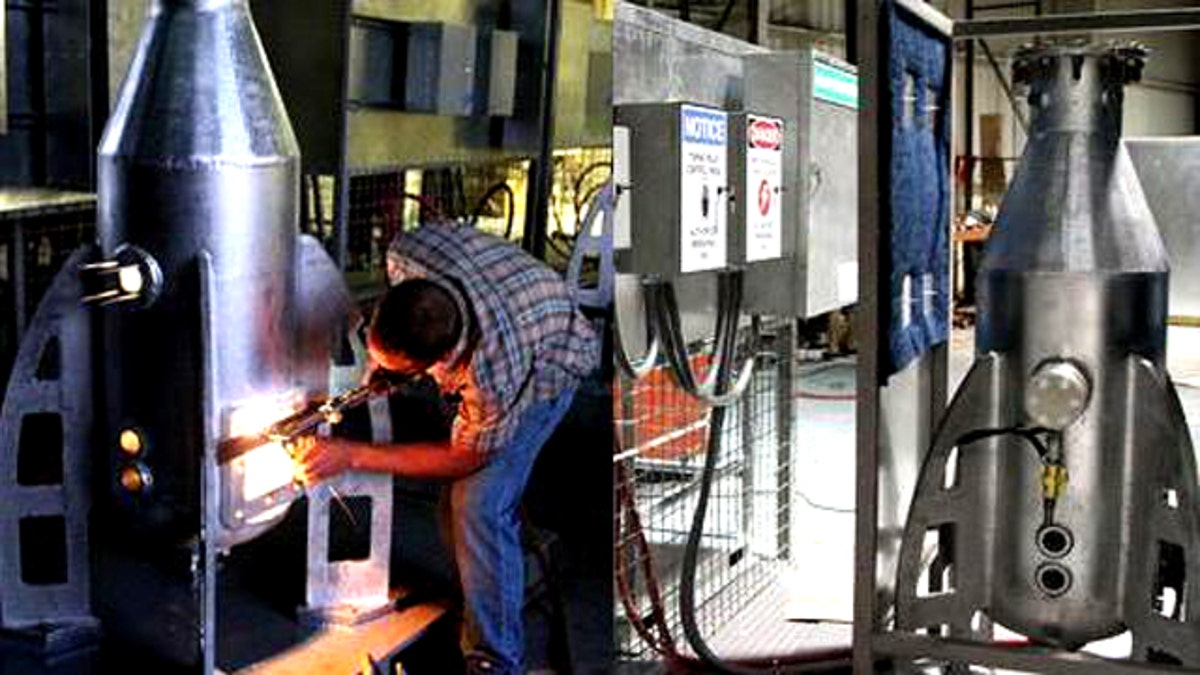
The website for Newton Systems shows the construction of hail cannons -- which inventor Newton Wimmer says can control the weather. (Newton Systems)
Kaboom! California's fruit farmers are using cannons to protect their crops.
Called hail cannons, the rocket ship-shaped devices use explosive acetylene to fire, shooting 200-mph shockwaves into the air designed to break up hail in the clouds and turn it into rain before it hits the ground.
But do they really work? Meteorologist Steve Johnson has been studying hailstorms for more than forty years and he thinks the cannons are all sound, no fury.
“As a scientist, and as far as science is concerned, they do not work,” Johnson told FoxNews.com. Farmers in the Valley beg to differ, saying the devices have helped save their crops.
“I've seen them work," Mike Thurlow, a farmer in Reedley, Calif., told FoxNews.com. "I've been in the middle of hailstorms next to them, and you get about a couple hundred acres of protection from a single hail cannon."
"They work,” Thurlow insisted.
Meteorologists and weather control experts argue that the only way to prevent hailstones from falling is to focus on the beginning stages of hail formation by seeding the cloud.
“The only way to interfere with Mother Nature’s ability -- hail suppression -- is ice nucleation,” he said, describing a process that prevents tiny ice particles from forming. “If you inject a tremendous number of embryos into the birth area of the thunderstorm, then it competes for the same water -- and you'll have more beneficial rain falling than a few large hailstorms,” Johnson explained.
Newton Wimer, owner of Newton Cannons, started building these giant weather guns six years ago. His anecdotal research indicates the cannons can help protect farmer’s crops for up to 190 square acres.
“It’s either one big coincidence or it’s having a really positive effect as far as stopping hail,” Wimer told FoxNews.com.
The Weather Modification Association -- yes there really is one, and yes it's quite serious -- posted a statement on its website that questions the validity of Wimer’s research.
“The Weather Modification Association does not endorse the use of hail cannons. To date there is a lack of what the Association considers to be any scientific evidence that hail cannons produce an effect on thunderstorms' ability to produce hailstones, including the reduction of damaging hail from those storms. Furthermore, there is no scientifically based expectation that this method will work.”
Wimer’s cannons aren't cheap, running around $50,000 apiece. That's not stopping the farmers in the Valley, who believe they are well worth the money spent.
“It’s more cost effective than crop insurance. Crop insurance never works out quite the way you want it to, at least in our experience. This is a real great viable alternative,” Thurlow said.
Johnson understands the farmer's concerns, and sympathizes. He just thinks they're wasting their money.
“They're being very foolish in thinking that, because sooner or later one of those hail storms is going to hit them,” he told FoxNews.com. Such frank opinions haven’t stopped farmers from buying hail cannons in droves. Kyle Friesen, a farmer in Kingsburg, Calif., has a couple of cannons on his farm, and he swears that they work.
“Other farmers around this last season got some hail around us. We had our cannon and we didn’t get any,” Friesen told FoxNews.com.
Wimer's business is blowing up -- just like his cannons. The entrepreneur is currently in the process of selling his explosive product to India. Wimer doesn’t claim to be an expert, just an inventor with a vision.
Johnson believes that these manufacturers are scamming potential buyers, arguing that they should be cautious.
“Beware! There are unscrupulous people -- or possibly a person -- who believes that they work trying to sell you a bill of goods that I promise you does not work,” he said.
